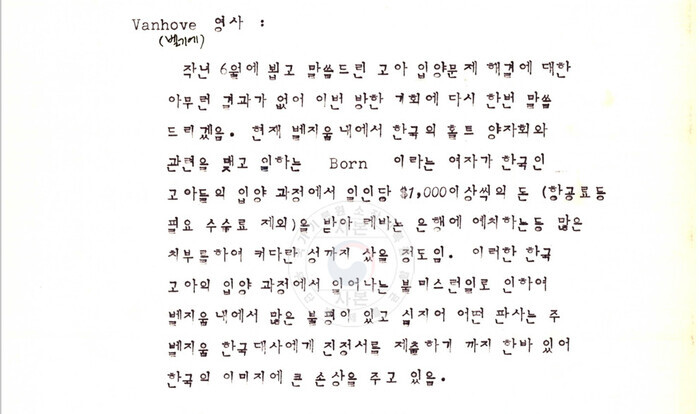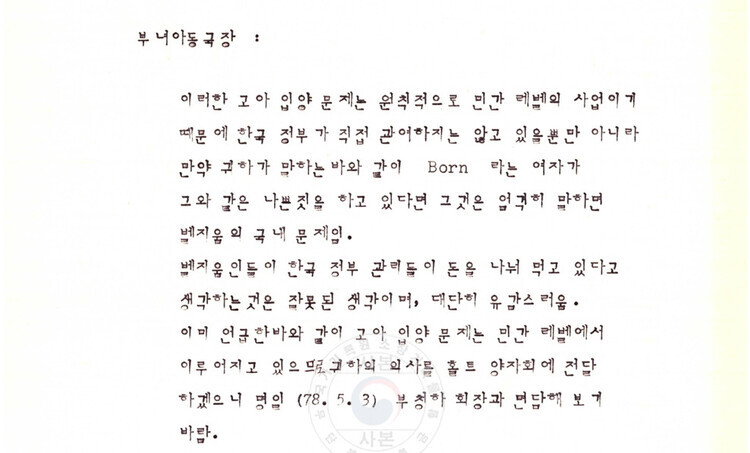
On May 2, 1978, Belgian Consul to Korea Van Hove met with the Director-General of the Women’s and Children’s Bureau of the Korean Ministry of Health and Social Affairs and informed him that Korean children were being trafficked illegally. Shown is a transcript of a conversation between Mr. Vanhove and the head of the Foreign Office in which a woman named Vaughn, who is associated with Mr. Holt, receives more than $1,000 for each adopted child and that the money is transferred to Lebanon. He said the money was funneled to banks. Van Hove said he had previously met with the director-general of South Korea’s Ministry of Health and Social Affairs in June, but the meeting resulted in no concrete changes. (National Archives of Korea)
South Korea’s Truth and Reconciliation Commission as part of a major investigation into illegal practices by adoption agencies and collusion and negligence by the South Korean government when large numbers of Korean children were adopted overseas from the 1970s to the 1990s. The group discovered documents from the 1970s that revealed details. The Belgian government has complained to the South Korean government that adoption agencies are accepting payment of adoption fees, and has requested that the issue be resolved. Although the South Korean government has maintained its innocence of what it describes as a private sector problem, these documents show that the South Korean government was in fact aware of widespread illegal overseas adoption but did nothing to address it. This seems to indicate that.
According to transcripts of conversations made by South Korea’s Ministry of Foreign Affairs between 1974 and 1981 and obtained by the Hankyoreh, the Belgian government complained several times about issues related to the overseas adoption of Korean orphans, including the illegal involvement of brokers. However, the South Korean government seems to have ignored that information. This issue was so important to the Belgian government that it requested a meeting with President Park Chung Hee himself.
Despite calls for action, the South Korean government took no action.
In a meeting on May 1, 1978, the Belgian consul to South Korea named Van Hove told the European director of the South Korean Ministry of Foreign Affairs that a Lebanese woman named Born, who was working with the Holt Adoption Program (Hold Children’s Services), was in Korea. He said he sells orphans to South Korea. Belgium costs between $800 and $1,200 per child. The consul added that since the issue is very urgent, he would like to have an audience with the president to inform the South Korean head of state of the issue.
Until the late 1970s, Belgium was the country that took in the largest number of Korean orphans, after the United States, Sweden, Denmark, and Norway.
The Belgian government appears to view this as a serious problem, as facilitating paid adoptions can be considered child trafficking.
Mr Vanhove complained loudly during his meeting with the European director, saying he had raised the issue in a meeting with another director of the Ministry of Health and Social Affairs the previous year, but to no avail. He added that he advised South Korean diplomats in Belgium that the South Korean government needed to take steps to prevent the involvement of brokers, but no action was taken.
Consul raises suspicions that South Korean bureaucrats are privatizing adoption committees
At that time, even under Korean law, it was illegal to accept adoption orders. The Enforcement Order for the Special Adoption Law enacted in 1977 allows adoption agencies to collect some or all of the adoption mediation fees from adoptive parents. In other words, agents are only compensated for actual costs.
During the meeting, Mr. Vanhove also mentioned rumors circulating in Belgium that South Korean government officials are taking some of the adoption fees privately. There was also speculation that there was some kind of cartel between private companies and the government.
The European director suggested that Vanhove speak to the officer in charge of the issue, namely the Director-General for Women and Children at the Ministry of Health and Social Affairs. However, Van Hove had already expressed similar grievances the previous year in a meeting with the same official on June 27, 1977. With no meaningful action taken over the past year, he went to the Foreign Office, only to be relegated this time to the Department of Health and Social Affairs.

On May 2, 1978, Belgian Consul to Korea Van Hove met with the Director-General of the Women’s and Children’s Bureau of the Korean Ministry of Health and Social Affairs and informed him that Korean children were being trafficked illegally. What is shown is a record of the statement made by the Director-General of the Women’s and Children’s Bureau, which states that the issue of orphan adoption is, in principle, a private sector issue, and that the issue of this woman named Born is strictly speaking a “domestic issue.” she says. For Belgium. ” (National Archives of Korea)
In a meeting with Van Hove the next day, the Director of the Women’s and Children’s Bureau stated that orphan adoption is a matter for private companies with no involvement from the South Korean government, and that if the intermediary receives a commission, that is not an issue. He said that there is. A problem for Belgium to deal with.
This problem remained unresolved even as adoption continued to expand overseas. A report prepared by the Ministry of Health and Social Affairs for the Blue House in 1988 (reported by the Hankyoreh last year) stated that the four adoption agencies received adoption fees of $1,450 per child, airfare, and U.S. adoption fees. It is stated that it was. She gets $3,000 to $4,000 in child support plus adoption arrangements.
Recognizing this problem, the government convened a meeting with heads of adoption agencies to address problems with the system. At the meeting, the agencies were criticized for acquiring large amounts of real estate with company profits, wasting exorbitant overhead costs, and collecting high fees from adoptive parents.
“The South Korean government appears to have used children as a diplomatic tool with the Nordic countries, where there was a high demand for adoptions,” said Herren Noh, a social welfare professor at Soongsil University who worked under Holt in the 1980s. speaks.
“It is shocking that the South Korean government turned a blind eye to poor adoption practices at the time. That neglect caused great harm to tens of thousands of adopted children, their birth families, and adoptive parents.” said Jung Firens, 47, who was sent to Belgium for adoption in 1977.
“If the South Korean government had taken the necessary measures, adopted children like me would not have been taken to a country far away from their birth parents.”
Kwak Jin-sang, reporter; reporter Jang Ye-ji
Please send your questions or comments here [english@hani.co.kr]
